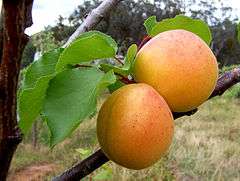apricot
English

Apricot fruits
Etymology
Alteration of apricock (with influence from French abricot), itself an alteration of abrecock (with influence from Latin apricum (“sunny place”)), from dialectal Catalan abrecoc, abercoc, variants of standard albercoc, from Arabic الْبَرْقُوق (al-barqūq, “plums”), from Byzantine Greek βερικοκκίᾱ (berikokkíā, “apricot tree”), from Ancient Greek πραικόκιον (praikókion), from Late Latin (persica) praecocia (literally “(peaches) which ripen early”), (mālum) praecoquum (literally “(apple) which ripens early”).
Pronunciation
Noun
apricot (plural apricots)
- A round sweet and juicy stone fruit, resembling peach or plum in taste, with a yellow-orange flesh, lightly fuzzy skin and a large seed inside.
- The apricot tree, Prunus armeniaca
- A pale yellow-orange colour, like that of an apricot fruit.
- apricot colour:
- A dog with an orange-coloured coat.
- (sniper slang) the junction of the brain and brain stem on a target, used as an aiming point to ensure a one-shot kill.
- (slang, Australia, dated, usually in the plural) A testicle.
Translations
fruit
|
|
tree
|
|
colour
Adjective
apricot (comparative more apricot, superlative most apricot)
- Of a pale yellowish-orange colour, like that of an apricot.
Translations
See also
- lekvar
- Appendix:Colors
This article is issued from
Wiktionary.
The text is licensed under Creative
Commons - Attribution - Sharealike.
Additional terms may apply for the media files.